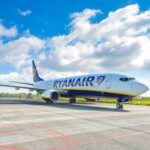EasyJet has put sustainability at the heart of its operation with new fuel-efficient aircraft and a focus on schemes that collectively will deliver a significant reduction in carbon emissions, said Mark Farquhar, the carrier’s chief training captain.
Speaking at the Royal Aeronautical Society’s President’s Summit 2023: Future of Flight in London, the senior easyJet executive said the issue of sustainability ran through the entire company, and influenced decisions from fleet renewal to adoption of new technology.
“We’re really passionate about this and it runs through our entire organisation,” Farquhar said. “We don’t just have a sustainability team that’s interested in it – our entire organisation is.”
EasyJet’s efficient operations
EasyJet is already an efficient operator, with carbon emissions intensity around 18% lower than the global average.
In 2021, the company demonstrated its first ever SAF flight with 30% blend out of London Gatwick, and it has carried out ultra low emissions turnaround trials at Bristol Airport, which resulted in a 97% reduction in CO2.
The low-cost carrier has also taken part in ground-breaking partnerships with Airbus and Rolls-Royce, and in November 2021 it signed up to the UN-backed Race to Zero.
EasyJet is targeting a 35% reduction in emissions intensity by 2035, and by 2050 net zero carbon emissions with a 78% reduction in intensity.
78% reduction in carbon emissions
Farquhar said: “The science based targets are suggesting that we should target by 2050 a reduction of 57% in carbon emissions. We’re aiming for 78%, and that’s been proven and validated with our plan.”
That target will be delivered through an ambitious fleet renewal programme comprising Airbus NEO aircraft that minimise fuel burn and emissions. There are 168 NEO aircraft to be delivered to the airline up until FY29.
There are also fuel savings to be made through initiatives including single engine taxi and engine washing, a 10% reduction by 2035 through the Single European Sky and modernisation of UK airspace, and residual emissions will be removed to reach Net Zero by 2050.
Farquhar added: “We’re not here to greenwash, we’re not here to just put a poster up and say we need to do it one day in the future, we’re here to make fundamental investments and changes to the way we’ve delivering our business as we go forward.”
Subscribe to the FINN weekly newsletter
You may also be interested in:
EasyJet launches Summer Flight School to inspire the younger generation

